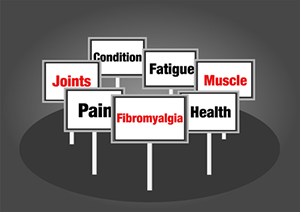 Do you wake up feeling tired and worn out every day? No, it’s not just a mild inconvenience.
Do you wake up feeling tired and worn out every day? No, it’s not just a mild inconvenience.
If you are over 50 and experience non-restorative sleep, then be cautious because this condition is a double-edged sword! It results in widespread pain in the body and could be one of the first signs of a serious disease – FIBROMYALGIA!
A research team led by Dr. John McBeth in Arthritis Research UK Primary Care Centre at Keele University in Staffordshire, have found that in people above 50, non-restorative sleep spells trouble.
It opens the door for widespread pain which in turn is strongly related to developing fibromyalgia. The findings have been published in Arthritis & Rheumatology journal.
It’s a well known fact that with an increase in age, musculoskeletal pain (related to bones, muscle and nerve) becomes more common. In fact from 65 years onward, 4 out of 5 people complain of experiencing pain on an everyday basis.
Around 4300 adults above 50 years took part in this study. Among them, 2700 participants complained of some pain though not widespread pain, while others did not experience any pain whatsoever.
The participants were asked to fill in questionnaires related to physical and mental health, past medical conditions, lifestyle and health behaviors and socio-demographic status. All these details helped the researchers identify if any of the patients fell in the risk category of developing widespread pain and consequently fibromyalgia.
The participants were constantly followed-up for a period of 3 years and then re-assessed for development of widespread pain.
The results showed that about 19 percent of participants who experienced mild to no pain had developed widespread pain in three years!
Of this, 25 percent were those who had complained of some pain earlier and 8 percent of participants had no pain previously.
The next step was to find out what factor played an important role in the development of pain. The researchers used a statistical tool to analyze patterns and identified the culprit! They found that the strongest link to the pain development was non-restorative sleep.
This has been further emphasized in another study in which healthy participants were woken up at various stages of deep sleep. The effect it had on them was particularly surprising – the participants actually developed a few typical features of fibromyalgia!
Another Norwegian study has also proved that poor sleeping habits are strongly associated with development of fibromyalgia. So the take-home lesson is: practice healthy sleeping habits to keep fibromyalgia at bay.
Having trouble sleeping? This simple method will knock you out in 24 minutes…

 Overcoming IBD
Overcoming IBD Multiple Sclerosis
Multiple Sclerosis Banishing Bronchitis
Banishing Bronchitis Gum Disease Gone
Gum Disease Gone Overcoming Onychomycosis
Overcoming Onychomycosis Neuropathy No More
Neuropathy No More The Prostate Protocol
The Prostate Protocol Brain Booster
Brain Booster
 Ironbound
Ironbound
 Solution for Shingles
Solution for Shingles
 The Bone Density Solution
The Bone Density Solution
 The Ultimate Healing Protocol
The Ultimate Healing Protocol
 The Parkinson's Protocol
The Parkinson's Protocol
 The Chronic Kidney Disease Solution
The Chronic Kidney Disease Solution
 Overthrowing Anxiety
Overthrowing Anxiety The Fatty Liver Solution
The Fatty Liver Solution The Hypothyroidism Solution
The Hypothyroidism Solution
 The End of Gout
The End of Gout The Blood Pressure Program
The Blood Pressure Program
 The Oxigized Cholesterol Strategy
The Oxigized Cholesterol Strategy
 Stop Snoring And Sleep Apnea Program
Stop Snoring And Sleep Apnea Program
 The Arthritis Strategy
The Arthritis Strategy The Vertigo & Dizziness Program
The Vertigo & Dizziness Program The 3-Step Diabetes Strategy
The 3-Step Diabetes Strategy Hemorrhoids Healing Protocol
Hemorrhoids Healing Protocol The Erectile Dysfunction Master
The Erectile Dysfunction Master Weight Loss Breeze
Weight Loss Breeze The IBS Program
The IBS Program The Insomnia Program
The Insomnia Program The Migraine and Headache Program
The Migraine and Headache Program The Neck Pain Solution
The Neck Pain Solution The Menopause Solution
The Menopause Solution The Ejaculation Master
The Ejaculation Master The TMJ Solution
The TMJ Solution The Acid Reflux Solution
The Acid Reflux Solution The Fibromyalgia Solution
The Fibromyalgia Solution The Psoriasis Strategy
The Psoriasis Strategy
Diagnosis of Chronic Fatgue Immune Dysfunction Syndrome has Fibromyalgia as 1 of the 1001 symptoms AWA sleep disorder syndrome, which isn’t just not being able to fall asleep but waking intermittently and not getting back to sleep AWA falling asleep immediately and sleeping for 1 hr then awake the remainder of the night, also symptom of PTS syndrome, the range is endless. In England its called myalgic encephalomyelitis and PET scans of brains shows black out areas in all parts of the brain. This is much, much, much larger than just poor sleep habits!!!!!!! and the medical community knows nothing about it and doesn’t want to know from my experience, they tell you its all in your head and put the blame on the patient, shame on them!!!!!! This article is something CFIDS and FM patients have know for years, nothing new.